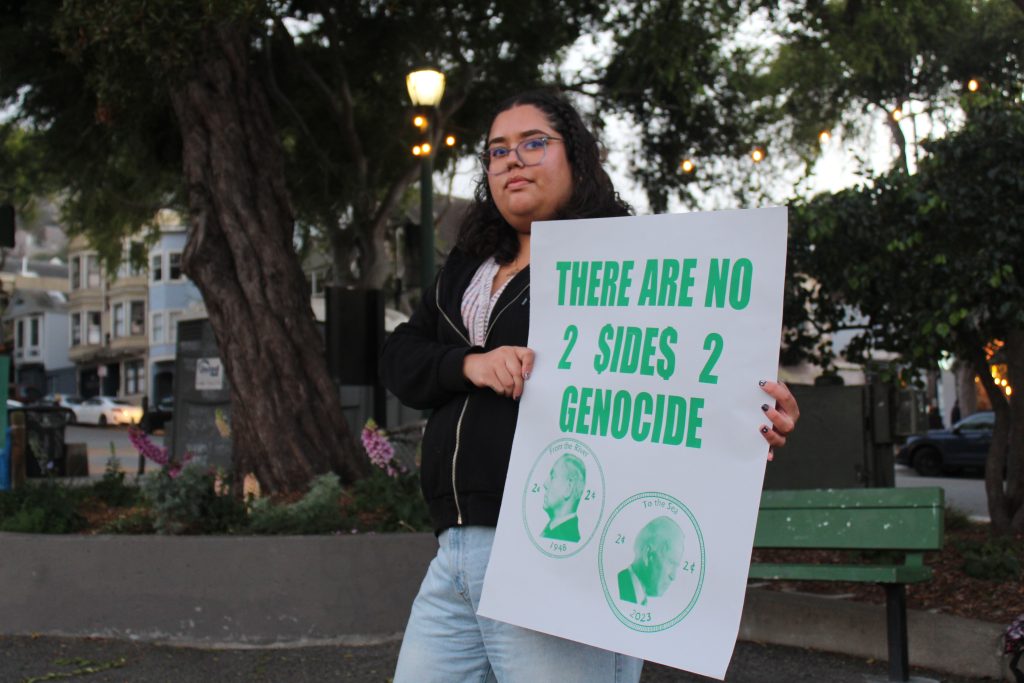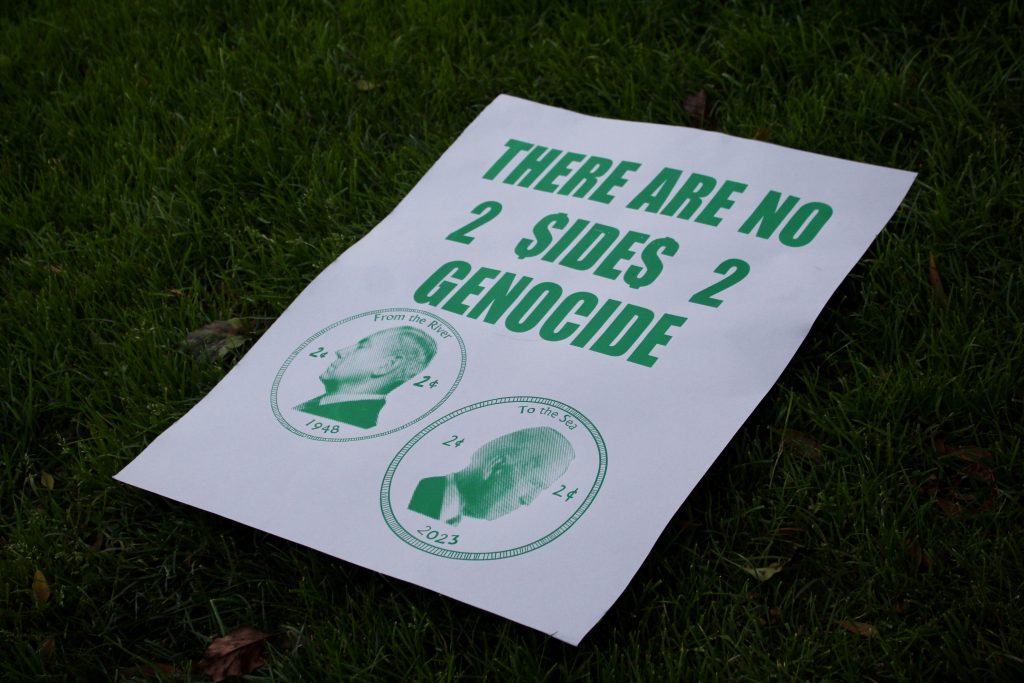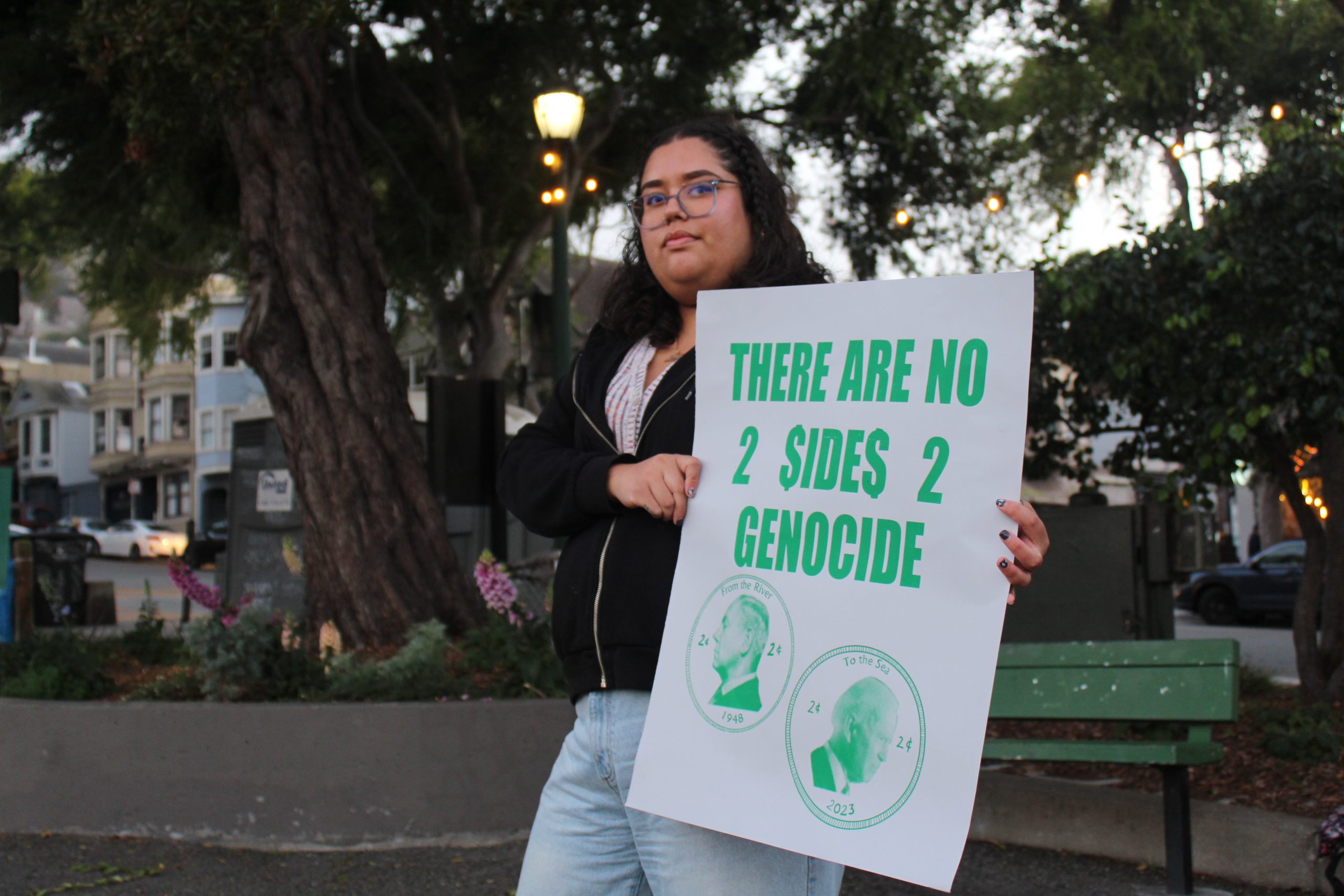Don’t have time to read? Click above to listen to the story instead.
As Alejandra Rubio quickly screen printed the faces of President Joe Biden and Israeli Prime Minister Benjamin Netanyahu onto dozens of posters before a protest, she felt her pent-up emotions from watching a genocide unfold on her phone begin to dissipate.
“My hands are covered in green ink,” Rubio recalled. “It felt good to be able to physically do something … and then to be able to give it to people, and then be amongst my peers, screaming and demanding liberation.”
The 26-year-old artist is among many Gen-Z Latinos who have joined the Palestinian movement, which calls on the U.S. government to end all financial support to Israel.
One year ago, fighting erupted after Hamas, a Palestinian militant group, launched a surprise invasion on Israel. The war has led to the deaths of, by some counts, over 40,000 Palestinians and over 1,000 people killed in Israel.
The conflict between Israelis and Palestinians has rumbled for decades, though with the rise of social media, people are seeing the war up-close in ways they haven’t before, leading many young people to criticize what they believe is the United States government’s complicity in the bloodshed.

Alejandra Rubio, 26, holds up a sign she screen printed and distributed at a Pro-Palestine protest last November.
Credit: Jacqueline Cardenas

A poster that Alejandra Rubio screen printed and distributed at a Pro-Palestine protest last November that reads: “There Are No 2 Sides 2 Genocide.”
Credit: Jacqueline Cardenas
Studies show that 45 percent of the 40 million Gen Zs who will be eligible to vote in 2024 are young people of color, including 8.8 million Latinos.
Gen Z is most frequently defined as people born between 1997 and 2012.
Though plenty of research is yet to be done on the population’s voting patterns and morphing political ideologies, organizers say the movement’s commitment is frequently influenced by how they view the Palestinian struggle abroad as tied to their own.
Rubio’s home is not being continuously bombed, but she said she can understand “what it means to be displaced” living in San Francisco’s Mission District, where gentrification has grown rampant.
“To some extent, I can understand what it means to fight for a home that is yours and be pushed out of it,” she said.
Affordable housing has become a primary concern for Rubio, as she has witnessed her houseless community members “be swept up in real-time.”
This experience, in addition to watching Palestinian mothers, fathers, children and journalists be massacred on social media, has led her to become critical of how frontrunner presidential candidates Kamala Harris and former president Donald Trump will choose to invest public dollars.
“This country does so much to literally fund wars and not fund resources that people quite literally need here and now,” she said.
Rubio said she remains undecided about who she will vote for in November but has been considering other political structures.
“Socialism does seem to catch my attention,” she said.
Rubio said she still has much to learn about different political systems, but she continues to wonder: “What can a world outside of just our current system look like? And how can we achieve that? And how can we start pushing for that?”
Keala Uchoa, a 23-year-old environmental justice organizer in San Francisco, said although Harris presents a more liberal agenda in comparison to Trump, she rejects the Democratic and Republican party because “people in my generation… are more willing to move past this narrative of ‘a lesser of two evils.’”
The United States has given $130 billion worth of aid since Israel’s founding after World War II.
Harris has repeatedly made clear that as president-elect, the United States will continue to support Israel.
“If a Democratic President and the Vice President right now, Harris, have not called for an arms embargo and are still funding this genocide as we speak, what makes anyone think that will change when Harris is in office?” Uchoa said.
Uchoa is currently looking at third-party candidates such as Claudia de La Cruz, Jill Stein, and Cornel West, all of whom have publicly condemned the genocide.
“One thing I know for certain is that I will not be co-signing genocide by voting for either major party candidate,” Uchoa said.

Keala Uchoa, a 23-year-old environmental justice organizer, said she will not be voting for Democrats or Republicans in November.
Credit: Jacqueline Cardenas
Alexandro José Gradilla, an associate professor of Chicana/o Studies Department at California State University, said Gen-Z Latinos’ support for Palestine and their break from the two major parties “is no accident.”
Gradilla credits part of this shift emerging back in 2016 and 2020 when Senator Bernie Sanders mobilized young people around working-class issues.
“They resonated with the issues of, ‘I identify as Latino or Latinx, but I also identify as a worker. None of these campaigns ever address the suffering that you see in our communities in terms of schooling or lack of access to housing,’” Gradilla said. “And then, of course, the larger environment of anti-immigrant sentiment, the development of detention camps, separating families and children.”
Many Gen-Z individuals have also experienced trauma despite some of the oldest members of the generation only reaching around 27 years old.
Gen-Z has lived through the #MeTooMovement, Black Lives Matter, the COVID-19 pandemic, the overturning of Roe V. Wade, hate crimes against trans lives, school shootings nationwide, and more.
“All of that, I believe, is part of the larger political social ecology that has given rise to this new political consciousness that I think is not a trend,” Gradilla said. “It is not temporary. As we see them get older, it’s going to be a reshaping of the political landscape, for sure.”
Though there are some Latinos who support Palestine, there is a generational gap between how younger and older Latinos view the war.
Latinos are the fastest-growing group of American evangelicals, with 15% of Latinos identifying as evangelical Protestants, according to NBC.
Latino immigrants are more likely than U.S.-born Latinos to be evangelical, according to Pew Research Center.
Some have come to embrace Zionism, a Jewish nationalist movement that seeks to create a Jewish state in Palestine.
One of the many reasons this is happening is because in places like East Los Angeles throughout the post-second World War period, Jewish Americans and baby boomer Latinos once lived near each other and struggled against discrimination.
“There’s a Jewish cemetery in East Los Angeles, and people don’t realize that because that hearkens back to that older generation that was there,” Gradilla said. “This is why I think in that older generation, there is more connection and solidarity with Jewish Americans and Israel because those were actually based on real relationships.”
Another factor that leads some immigrant Latinos towards evangelicalism is the trauma they carry with them after fleeing poverty in their home countries, which has led some to feel affirmed by churches when they successfully climb up the American socioeconomic ladder in a way they couldn’t before.
“This American style evangelical culture, but in Spanish, and heavily Latino flavored is appealing to these people because they talk about…the Word of God. But then they also kind of validate everybody and talk about, ‘hey, you worked hard, and that’s exactly what the Lord wants you to do,’” Gradilla said.
But Gen-Z Latinos like Alejandra Rubio see beyond the capitalistic ‘American Dream’ her Mexican immigrant parents chased.
“If this American Dream is not achievable, if we are watching people literally being blown up across the world and it being funded by the U.S., if we’re watching our houseless neighbors literally being swept up like trash, then what can we do besides forwardly dream and forwardly act?” Rubio said.
Rubio said she wants to continue to create art that calls attention to the genocide, but in the meantime, she’s not convinced by either major party.
“I know just by watching these debates and stuff…it seems like our presidential candidates are a little worried,” she said. “And I think they should be.”

Jacqueline Cardenas (she/they) is the Editor for Latino News Network West. Through their reporting, they wish to expose injustice and touch the hearts of many by helping people see parts of themselves in every story.
Got a tip? Email her at: jacqueline@latinonewsnetwork.com
